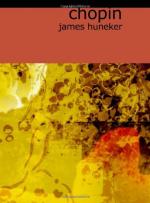III. ENGLAND, SCOTLAND AND PERE LA CHAISE.
The remaining years of Chopin’s life were lonely. His father died in 1844 of chest and heart complaint, his sister Emilia died of consumption—ill-omens these!—and shortly after, John Matuszynski died. Titus Woyciechowski was in far-off Poland on his estates and Chopin had but Grzymala and Fontana to confide in; they being Polish he preferred them, although he was diplomatic enough not to let others see this. Both Franchomme and Gutmann whispered to Niecks at different times that each was the particular soul, the alter ego, of Chopin. He appeared to give himself to his friends but it was usually surface affection. He had coaxing, coquettish ways, playful ways that cost him nothing when in good spirits. So he was “more loved than loving.” This is another trait of the man, which, allied with his fastidiousness and spiritual brusquerie, made him difficult to decipher. The loss of Sand completed his misery and we find him in poor health when he arrived in London, for the second and last time, April 21, 1848.
Mr. A. J. Hipkins is the chief authority on the details of Chopin’s visit to England. To this amiable gentleman and learned writer on pianos, Franz Hueffer, Joseph Bennett and Niecks are indebted for the most of their facts. From them the curious may learn all there is to learn. The story is not especially noteworthy, being in the main a record of ill-health, complainings, lamentations and not one signal artistic success.
War was declared upon Chopin by a part of the musical world. The criticism was compounded of pure malice and stupidity. Chopin was angered but little for he was too sick to care now. He went to an evening party but missed the Macready dinner where he was to have met Thackeray, Berlioz, Mrs. Procter and Sir Julius Benedict. With Benedict he played a Mozart duet at the Duchess of Sutherland’s. Whether he played at court the Queen can tell; Niecks cannot. He met Jenny Lind-Goldschmidt and liked her exceedingly—as did all who had the honor of knowing her. She sided with him, woman-like, in the Sand affair—echoes of which had floated across the channel—and visited him in Paris in 1849. Chopin gave two matinees at the houses of Adelaide Kemble and Lord Falmouth—June 23 and July 7. They were very recherche, so it appears. Viardot-Garcia sang. The composer’s face and frame were wasted by illness and Mr. Solomon spoke of his “long attenuated fingers.” He made money and that was useful to him, for doctors’ bills and living had taken up his savings. There was talk of his settling in London, but the climate, not to speak of the unmusical atmosphere, would have been fatal to him. Wagner succumbed to both, sturdy fighter that he was.




